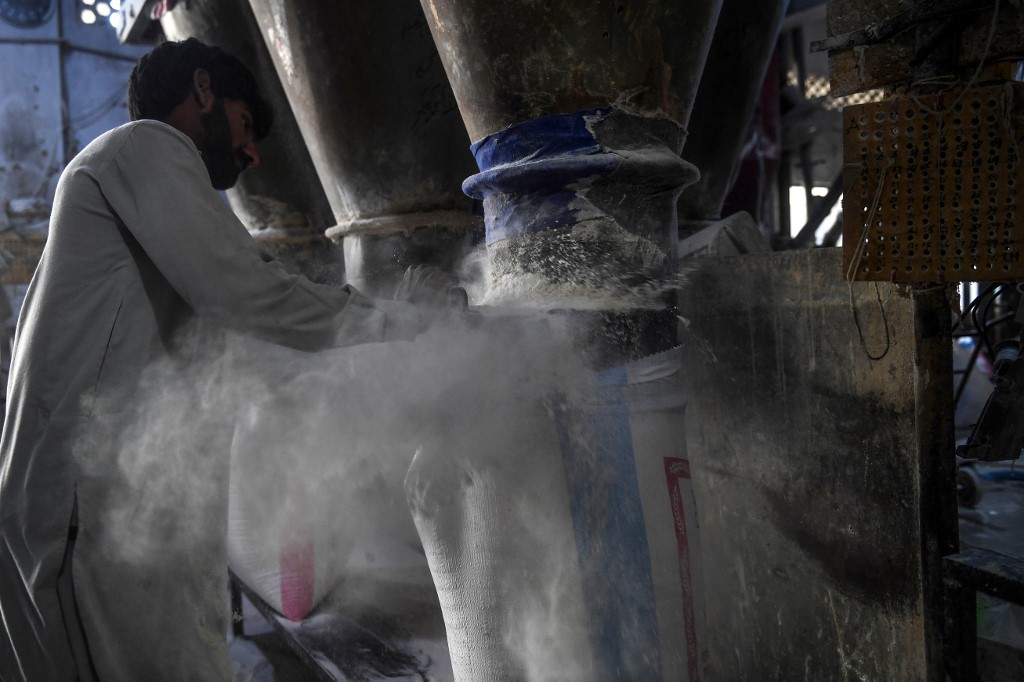KARACHI: A vessel carrying 65,000 metric tons of wheat entered Pakistan’s seaport of Karachi on Saturday, after an earlier ship with 60,804 tons of wheat from Ukraine reached the port on Wednesday, officials confirmed, as the grain is imported for the first time in five years amid a shortage in the local market.
The imports follow the government's decision in June to allow the private sector to imports foreign wheat duty free, as the commodity's shortage has been fueling price hikes of the staple and, consequently, public discontent. Pakistan's previous wheat import of 686,650 metric tons worth $185.4 million was in fiscal year 2014-15.

A worker fills sacks with wheat flour at a mill in Karachi on Jan. 21, 2020. (AFP/File)
“The second vessel will be moored on Monday that is carrying 65,000 metric tons of wheat. The offloading will start on Monday as due to rains and Muharram Holidays it could not be fully started," Muzzamil Rauf Chappal, chairman of the Cereal Association of Pakistan (CAP), told Arab News on Sunday.
Pakistan's current wheat stocks are 26.05 million tons, by 1.41 million tons short of this year's target. Importers already have matured contracts for the import of 600,000 tons of wheat from foreign suppliers.
"Collectively the importers have booked 600,000 tons of wheat so far. These shipments were booked at $224 to $240 a ton for deliveries in August-September," Chappal said, adding this should translate into the price of wheat at Rs45-46 per kilogram in the local market.
Last week, the Economic Coordination Committee (ECC) allowed the state-owned Trading Corporation of Pakistan (TCP) to place an order for 200,000 tons. The TCP received bids ranging from $233.85 to $296.6 per metric ton.
While millers say the imports are unlikely to reduce the price of flour, they would prevent further hikes.
"The imported wheat has not arrived in the market but due to the news the prices have decreased by Rs50-100 per 40 kilograms," Asim Raza Ahmad, chairman of the Pakistan Flour Mills Association (PFMA), told Arab News. "But it has no long-term impact on the prices and it could not be reduced because government rates are lower and the imported wheat is expensive. It would be difficult for the private sector to match with government rates. Besides, the shortfall is huge."
Farmers, meanwhile, bemoan the government's move to buy the expensive foreign wheat.
"The first ship is estimated to have cost the country around Rs3 billion which was paid to foreign farmers. If the same amount of wheat would have been purchased from local farmers it would cost Rs2 billion," said Dr. Ibrahim Mughal, chairman of Agri Forum Pakistan.
Officials say they are planning to increase the country's wheat output next year.
"We are planning to increase wheat production for next year. We are providing certified seeds and other incentives to the farmers and have targeted to increase per acre production from 28 maund (1,045 kilograms) to 35 maund (1,306 kilograms)," Dr. Javed Humayun, senior joint secretary at the Ministry of National Food Security and Research, told Arab News.
During past two months, the price of wheat flour has increased to over Rs73 per kilogram in parts of the country, leading to an increase of the price of bread by Rs2-3 to Rs12-15 per naan.
"We are purchasing a bag of flour for Rs3,000 which was available for Rs2,250 only couple of months ago," said Malik Dilawar, a tandoor owner in Karachi. "We were forced to increase the prices as it was not viable to run the business."




















